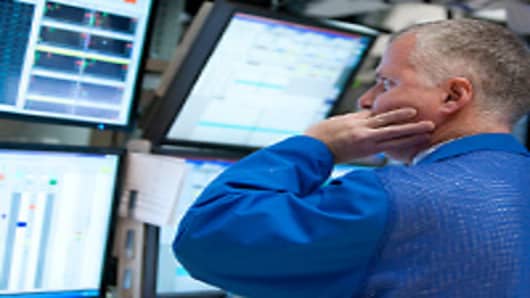All those sidelined investors waiting for a good entry point to the stock market may have watched a perfectly good rally pass them by.
Market volume has been on a steady dropoff since concerns over European debt re-emerged last August, even as stocks have been on an equally persistent climb.
But rather than being prudent as they look for the numerous fears and uncertainties to subside, the retail investors who have sat out the turmoil have run the risk that they'll all start piling in too late.
"The all-clear sign is probably never going to happen," says Keith Springer, president of Springer Financial Advisory in Sacramento, Calif. "The market is going to rally so much that the average investor will get complacent, throw in the towel and get in. And that's what typically happens at market tops."
The danger is that when the retail investor gets in, the big-money buyers will start taking profits and the market will turn lower.
In market terms, it's called "capitulation" — that moment when investors no longer can stand against the tide and finally join the crowd. Though often associated with market bottoms and the accompanied selling, this time around capitulationwould coincide with the top of the rally when investors get caught buying high and selling low.
After all, no one could be blamed for fearing this market.
The near-certainty of sovereign debt defaults in Greece and elsewhere presents the great unknown of whether Wall Street is heading for another Lehman Brothers-like moment.
In the interim, though, institutional investors and high-frequency traders keep on buying, while money continues flowing away from stocks.
"Really, there's just no fundamental reason to buy this market," Springer says. "The European situation is nowhere near being solved. It's just in a lull period. Everyone knows it, but it's off the front page and out of our face."
Mutual funds that invest in stocks saw outflows of $1.6 billion in January, while bond funds took in a gaudy $31.8 billion, the biggest inflow in nearly two years, according to market research firm TrimTabs.
That occurred as the average mutual fund gained a stunning 7.5 percent, about triple the rise in bond funds.
Yet smaller investors remain planted away from the action.
"There's clearly a lack of conviction or a lack of interest. I don't really know how to explain it," says Dan Greenhaus, chief global strategist at institutional trading and brokerage firm BTIG in New York. "There's basically nobody trading and hasn't been in months and months and quarter and quarters...Everything just tells me there's a lack of conviction to the upside, and the downside."
Long-standing correlationsalso are beginning to break down. Oil, stocks and gold all are rising together, and like movements within stock indexes also are well off the historic highs they've reached in recent months.
Though traditionally bearish about the market outlook, Greenhaus says he's been buying. But he's ready to take a break as well.
"Given the apparent imminence of a Greek default, there's nothing wrong with saying let's take a break here and see," he says. "I believe with all my heart that taking a wait-and-see approach is the right way to go. Maybe I'm wrong and I'll miss a few points, but that's fine."
Of course, somebody is making money as the rally continues.
In fact, it is the investor apathy that is convincing some to stay in until the crowd becomes confident enough to step in.
"What keeps us enthusiastic about stocks is the fact that the public is not involved in any way," says Dennis Gartman, hedge fund manager and author of The Gartman Letter. "We know this because investors are and have been pulling money from their mutual funds consistently over the past several years."
It's likely the old story then — fear and greed dominating the market, with retail investors missing out during the fear stage and then getting suckered in when greed takes over.
Says Gartman: "The public is frightened of investing, and if the public is frightened we should be enthusiastic."



